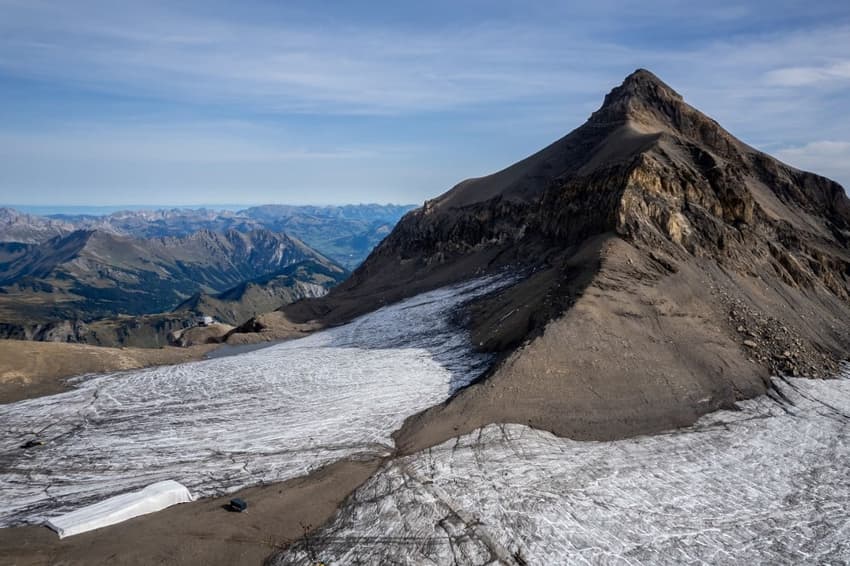Switzerland saw hottest year on record in 2022

Switzerland said on Monday that it experienced its hottest year on record in 2022, with its cherished Alpine glaciers melting at three times the rate previously considered extreme.
The record heat had a negative effect on the landlocked European nation's lakes, rivers, forests and agriculture, the environment ministry said in its climate overview for the year.
"For Switzerland, 2022 was the hottest year in history," it said in a statement.
"The year 2022 was the warmest and sunniest year since measurements began in 1864. While the annual average temperature for 1991 to 2020 was 5.8C, that of 2022 was climbed to 7.4C."
In the summer months, temperatures above 36C were recorded both north and south of the Alps. "Only the scorching summer of 2003... was warmer," the environment ministry said.
The hottest day ever in Switzerland was recorded in Geneva on August 4th, with thermometers hitting 38.3C.
Melting away
Swiss glaciers have never lost so much of their volume as in 2022: six percent of the remaining ice melted away last year.
"The year 2022 redefines the game, because until then, a loss of two percent was already considered extreme," the overview said.
Small glaciers have "practically disappeared", the environment ministry said, so much so that measurement has been suspended for the Pizol Vadret dalCorvatsch and Schwarzbachfirn glaciers.
READ ALSO: How melting glaciers are shifting Switzerland's borders
Lake Constance reached a record low water level of 394.7 metres between July 15 and August 20, while Lake Lugano and Lake Maggiore were at historically low levels for the first eight months of the year.
Low water levels had a "considerable impact" on hydroelectric power plants, with many forced to suspend operations at points, with production down 15.2 percent on the year before.
Temperatures in Switzerland's lakes and rivers often reached 25C or above. At those temperatures, oxygen levels decrease, with some lake experiencing algae blooms, while the survival of fish is also threatened.
READ MORE: Why Switzerland’s glaciers are melting faster than usual this summer
Comments
See Also
The record heat had a negative effect on the landlocked European nation's lakes, rivers, forests and agriculture, the environment ministry said in its climate overview for the year.
"For Switzerland, 2022 was the hottest year in history," it said in a statement.
"The year 2022 was the warmest and sunniest year since measurements began in 1864. While the annual average temperature for 1991 to 2020 was 5.8C, that of 2022 was climbed to 7.4C."
In the summer months, temperatures above 36C were recorded both north and south of the Alps. "Only the scorching summer of 2003... was warmer," the environment ministry said.
The hottest day ever in Switzerland was recorded in Geneva on August 4th, with thermometers hitting 38.3C.
Melting away
Swiss glaciers have never lost so much of their volume as in 2022: six percent of the remaining ice melted away last year.
"The year 2022 redefines the game, because until then, a loss of two percent was already considered extreme," the overview said.
Small glaciers have "practically disappeared", the environment ministry said, so much so that measurement has been suspended for the Pizol Vadret dalCorvatsch and Schwarzbachfirn glaciers.
READ ALSO: How melting glaciers are shifting Switzerland's borders
Lake Constance reached a record low water level of 394.7 metres between July 15 and August 20, while Lake Lugano and Lake Maggiore were at historically low levels for the first eight months of the year.
Low water levels had a "considerable impact" on hydroelectric power plants, with many forced to suspend operations at points, with production down 15.2 percent on the year before.
Temperatures in Switzerland's lakes and rivers often reached 25C or above. At those temperatures, oxygen levels decrease, with some lake experiencing algae blooms, while the survival of fish is also threatened.
READ MORE: Why Switzerland’s glaciers are melting faster than usual this summer
Join the conversation in our comments section below. Share your own views and experience and if you have a question or suggestion for our journalists then email us at [email protected].
Please keep comments civil, constructive and on topic – and make sure to read our terms of use before getting involved.
Please log in here to leave a comment.